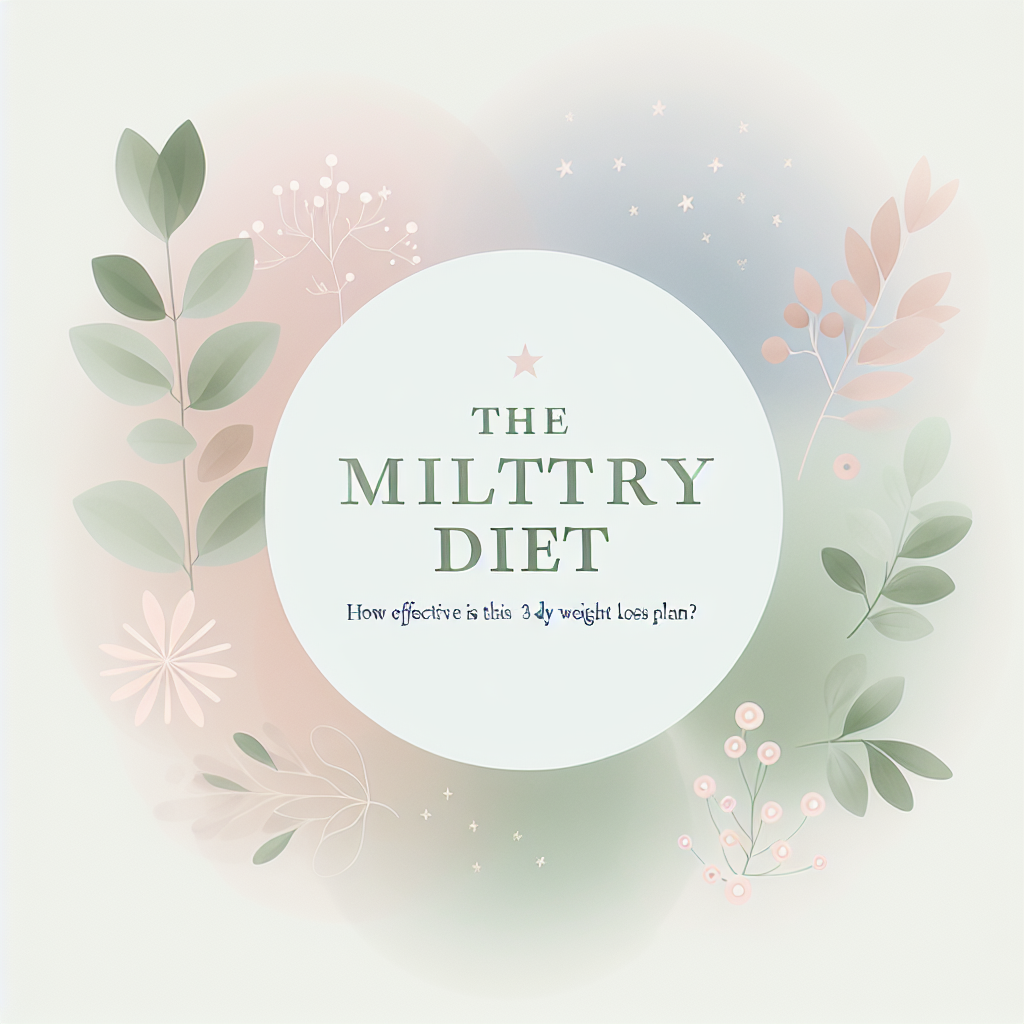
The world of dieting is vast and varied, with countless options promising quick and effective weight loss. Among these, the Military Diet stands out for its promise of rapid weight loss within a short timeframe. This diet claims to help individuals shed up to 10 pounds in just three days, making it an attractive option for those seeking quick results. But how effective is this method, and what does it entail? This article delves into the details of the Military Diet, examining its structure, potential benefits, and drawbacks.
Understanding the Military Diet
The Military Diet, also known as the 3-Day Diet, is a short-term, low-calorie eating plan. Despite its name, it has no official connection to military operations or the armed forces. The diet is structured to be followed for three consecutive days, with a prescribed menu that emphasizes specific food combinations thought to boost metabolism and promote fat burning.
During the three days, participants consume a set menu for breakfast, lunch, and dinner, with no snacks allowed. The daily caloric intake typically ranges between 1,100 to 1,400 calories, significantly lower than the average recommended intake for adults. After the initial three days, dieters are encouraged to eat normally but healthily for the next four days. This cycle can be repeated several times until the desired weight loss is achieved.

This diet’s appeal lies in its simplicity and the promise of quick results. However, it’s crucial to understand the potential impact of such caloric restriction on the body.
How the Diet Works
The Military Diet’s structure is based on calorie reduction and specific food combinations. The diet includes common foods like toast, eggs, tuna, bananas, and even vanilla ice cream. Proponents of the diet claim these combinations create a unique metabolic reaction that helps burn fat more effectively.
Sample Menu
Here’s a typical breakdown of the diet’s menu over the three days:
- Day 1:
- Breakfast: A slice of toast with peanut butter, half a grapefruit, and coffee or tea.
- Lunch: A slice of toast, half a cup of tuna, and coffee or tea.
- Dinner: A small portion of meat, one cup of green beans, a small apple, half a banana, and one cup of vanilla ice cream.
- Day 2:
- Breakfast: An egg, a slice of toast, and half a banana.
- Lunch: One cup of cottage cheese, a hard-boiled egg, and five saltine crackers.
- Dinner: Two hot dogs (no bun), one cup of broccoli, half a cup of carrots, half a banana, and half a cup of vanilla ice cream.
- Day 3:
- Breakfast: Five saltine crackers, a slice of cheddar cheese, and a small apple.
- Lunch: A hard-boiled egg and a slice of toast.
- Dinner: One cup of tuna, half a banana, and one cup of vanilla ice cream.
The food choices are specific and must be adhered to for the diet to be effective. Participants are advised to drink plenty of water and can substitute foods with similar calorie counts if necessary.
Analyzing the Effectiveness
The Military Diet’s effectiveness is primarily due to its low-calorie approach. By significantly reducing caloric intake, the body is forced to use stored fat for energy, leading to weight loss. However, the rapid weight loss promised by the diet is often attributed to water loss rather than fat loss.
Scientific Perspective
From a scientific standpoint, there is limited evidence supporting the notion that specific food combinations can enhance metabolic rates. The weight loss experienced during the diet is mainly due to caloric restriction. Nutrition experts often caution against such diets for long-term weight management due to potential nutrient deficiencies and the likelihood of regaining weight after the diet ends.

Risks and Considerations
While the Military Diet may offer quick weight loss, it comes with potential risks. The low caloric intake can lead to fatigue, dizziness, and irritability. Moreover, the lack of variety and nutrients could result in deficiencies if followed for an extended period. For those with underlying health conditions, such restrictive diets should be approached with caution and ideally under medical supervision.
Comparing with Other Diets
To understand where the Military Diet stands, it’s helpful to compare it to other popular diets. Here’s a table highlighting some key differences:
| Aspect | Military Diet | Keto Diet | Mediterranean Diet |
|---|---|---|---|
| Duration | 3 days | Long-term | Long-term |
| Caloric Intake | 1,100-1,400 | Varies | Moderate |
| Food Variety | Limited | Moderate | High |
| Focus | Calorie deficit | Low-carb, high-fat | Balanced eating |
| Weight Loss Type | Rapid | Gradual | Gradual |
| Nutritional Balance | Low | Moderate | High |
The table illustrates that while the Military Diet offers rapid weight loss, it lacks the nutritional balance and sustainability found in diets like the Mediterranean Diet. This comparison highlights the importance of considering long-term health impacts when choosing a diet plan.
Practical Tips for Success
If you’re considering the Military Diet, here are some practical tips to help maximize results while maintaining health:
- Stay Hydrated: Drink plenty of water to help maintain energy levels and promote satiety.
- Incorporate Exercise: Engage in light to moderate physical activity to support weight loss and improve overall health.
- Plan Ahead: Prepare meals in advance to ensure adherence to the diet without deviations.
- Listen to Your Body: Pay attention to hunger cues and health signals. Stop the diet if you experience significant discomfort or fatigue.
- Post-Diet Transition: After completing the diet, transition to a balanced eating plan to maintain weight loss and support overall health.
Frequently Asked Questions
Is the Military Diet safe for everyone?
The Military Diet may not be suitable for everyone, especially those with underlying health conditions or nutritional needs that require a more balanced diet. It’s advisable to consult a healthcare professional before starting.
Can I substitute foods in the Military Diet?
Yes, substitutions are allowed as long as they have similar calorie content. However, sticking to the prescribed menu is recommended for optimal results.
How often can I repeat the Military Diet?
The diet can be repeated in its 3-on, 4-off cycle until desired results are achieved. However, long-term reliance on such a restrictive diet is not recommended.
Will I regain weight after the Military Diet?

Rapid weight loss diets often result in regaining weight once normal eating resumes, especially if no lifestyle changes are made. It’s important to adopt healthy eating habits post-diet.
What are common side effects of the Military Diet?
Common side effects include fatigue, irritability, and hunger due to the low caloric intake. These effects can vary based on individual tolerance and adherence to the diet.
Conclusion
The Military Diet presents a quick-fix solution for weight loss, appealing due to its simplicity and short duration. However, the sustainability and health implications of such a low-calorie diet warrant careful consideration. Balancing immediate weight loss goals with long-term health is crucial, and individuals should prioritize diets that promote overall well-being beyond the numbers on the scale.
Ready to Transform Your Health?
🥑 Download our FREE Complete Keto Diet Plan and start your journey to better health today!
[convertkit form=7803861]
—
Disclaimer: This content is for informational purposes only and does not constitute medical advice. Always consult a qualified healthcare professional before making changes to your health regimen.





